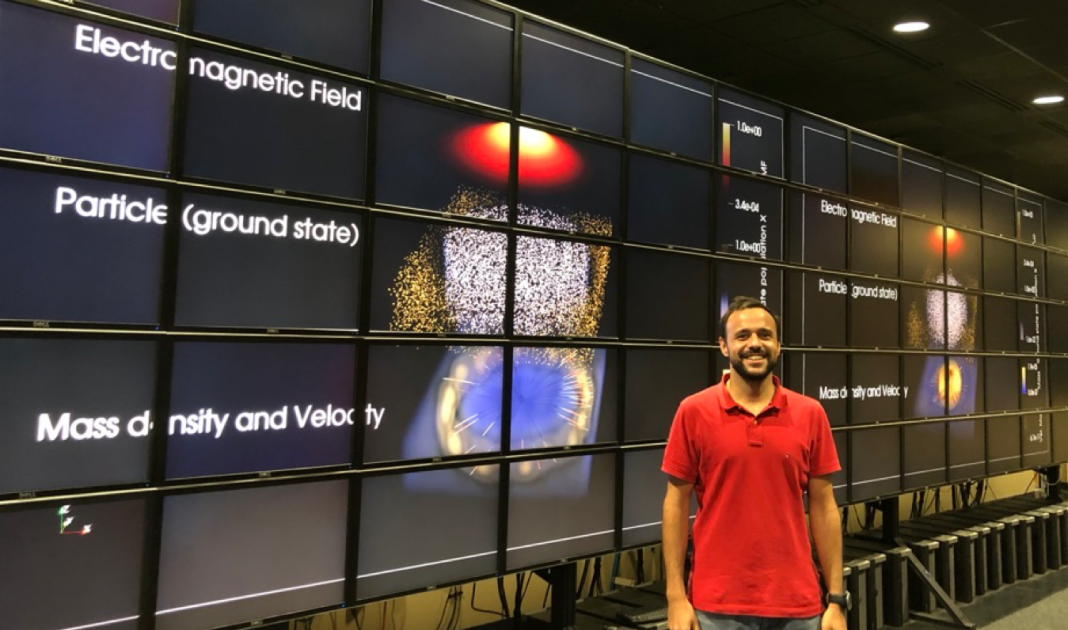This Fall, Nuno Azevedo Silva spent two months at UT Austin, immersed in our Advanced Computing Training Program. Read about his experience and lessons learned.
Nuno Azevedo Silva graduated in Physics at the Faculty of Sciences of the University of Porto and completed his MSc degree in Theoretical Physics at the University of Porto in 2013. Following a brief experience under a scientific research grant, he engaged in the MAP-fis doctoral program at the University of Porto, concluding his Ph.D. in Physics in January 2019.
Currently, a Post-doc researcher at the Centre for Applied Photonics at INESC TEC, Nuno submitted his application for the Advanced Computing Training Program, offered by UT Austin Portugal, confident to have found an opportunity to expose himself to “next level HPC solutions”.
And so, in September, Nuno traveled to Austin in order to work with the HPC group of the Texas Advanced Computing Center (TACC).
– What motivated you to apply for the Advanced Computing Training Program?
My current research is mainly focused on using computer systems to solve complex physical problems and on how high-performance tools can contribute to a timely research, in particular in the field of photonics. Still, most of my previous work focused on the use of GPUs (Graphic Processing Units) to accelerate our research, a strategy that is limited to the small internal memory of these devices. As one of the state-of-the-art facilities and research centers in distributed computing, TACC represented a natural choice and excellent opportunity to learn more about the paradigms of distributed computing and large-scale simulations.
– In Portugal, you work in the photonics field. What type of research work were you involved in while at TACC?
Following the initial contact with my supervisor, Dr. Bill Barth (at the time, Director of the High Performance Computing group), and taking into consideration my background and the short period of my stay, we established a three-phase plan, which covered an introductory, a development and a research phase – these last two focused on a pet project in the simulation of quantum optics systems in non-equilibrium conditions. This strategy allowed me to maximize the impact of TACC in my research, to learn and develop new knowledge with the help of their experts.
– In what way will the work you have developed these last few months impact your research work at INESC TEC moving forward?
On the one hand, the program provided an opportunity to fill some gaps in my skills-set, trailing new paths, which in itself can mean a great kick-start for a long-term scientific career. Also, it was an excellent opportunity to establish an in-situ network in one of the most advanced computing research centers and that will reverberate positively in short and medium-term research projects. On the other hand, the knowledge I have now will be an important asset to consolidate a strategic vision of our research group, and will help to establish the Centre for Applied Photonics group of INESC TEC at the upfront of groundbreaking fundamental research in photonics at an international level.

– How did you find the entire experience of living and working abroad?
Living and working abroad is always an enriching experience: you become acquainted with different habits, ideas and lines of thought, which ultimately turns into an immersive and effortless learning experience. On top of that, Austin is a friendly city, with a vivid culture, nice places and good weather, which provides a great balance between a state-of-the-art and a rewarding work environment and a high-quality living style.
– What useful advice(s) would you give to future participants of the Advanced Computing Training Program?
Be prepared and have a good picture of what you want to learn. TACC is a well-organized institution with its schedule, structure and working methods. They will welcome you and will be open to teaching you, but you will benefit the most if you are proactive, if you encounter your own problems (those of your typical research) and let them help you towards finding solutions. Also, do not forget to check the schedule of the regular and very interesting lectures and seminars taking place at The University of Texas at Austin, in departments of your interest – you will not regret it.
– Can you share with us three of the biggest lessons you take away from this experience?
First, ask questions and you will get answers. TACC is an open-minded, seamless organization, whose mission is advancing science through the application of advanced computing technologies. This means that they are more than willing to help you, but also leads to the second lesson: you can work alone through small problems, but the hard ones will often require a great team. Third and finally, (and concerning the specific subject of advanced computing systems) “do not use a sledgehammer to crack a nut” – use the appropriate tool and strategy for each job.

